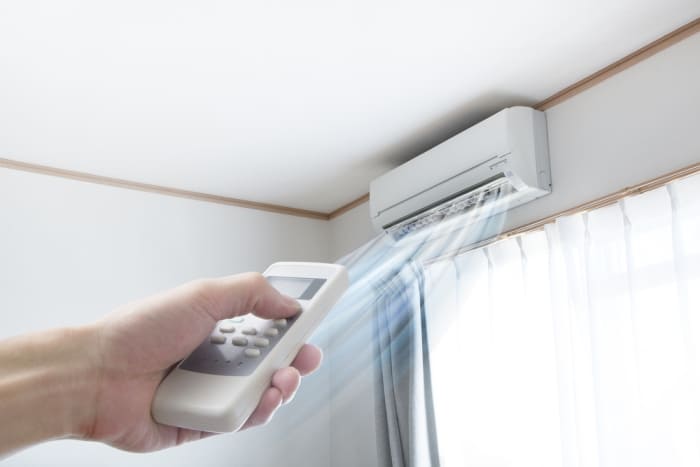
Do you know that cooling off in late spring and summer is an invariable thought? You need to invent a way to keep your home cool to avoid sunburns, heat strokes and improve the quality of air in your home. Even better, you would want your loved ones to stay comfortable all year. For this reason, one of the paramount concerns in cooling a home is the outlay and cost.
Research conducted in 2010 revealed that 48% of the average America’s household energy bill is accounted for air conditioning and heating. How Much Electricity Does Ac Use? Conversely, electronic devices have taken over as the majority in recent years, but the outlay and cost of cooling and heating continue to escalate as oil and gas prices increase.

The Energy Consumption in Air Conditioning Unit
Amazingly, small portable air conditioners for rooms continually run all through the hot seasons to keep your offices and homes cool and hence, an average of 897 kWh of electricity per month. Remember that the energy is used more in hot seasons.
With this in mind, can you guess how much energy an AC consumes? As a fact, there is no definite number. You only need to check the specifications for your air conditioning unit. Although the energy use for every unit differs, here are some average approximations and popular AC units that are installed:
- Small Window Units- 500 Watts
- Medium Window Units-900 Watts
- Large Window Units-1440 Watts
- Central Air Conditioner- 3500 Watts
It is evident that as the size of every central air conditioner differs, the wattage will also vary. Thus, you will use more electricity if you have more tons. For instance, if you have a 2.5 ton AC unit, you are likely to use power around 3200W to 3800W.
What’s the Difference between Large, Medium and Small Window Units?
The valid difference between the large, medium and small units is, of course, the BTU. If you observe, when buying an air conditioning unit, you are given the square footage covered that is directly connected to the BTU. Here are examples of AC units in regard to their BTU.
- Small Window Units – 6000 BTU
- Medium Window Units-12000 BTU
- Large Window Units-20000 BTU
Note: some window units consume up to 25000 BTU and hence using around 2600 Watts of electricity to function.
How much will it Cost You?
Cooling your house can be quite an expense, and hence you need to make a wise decision when installing an AC. Moreover, the cost to operate an air conditioner varies on the size. Nevertheless, here are examples of the average price for every AC size unit:
- Small Window Units- $ 35 every month
- Medium Window Units- $62 every month
- Large Window Units- $1 00 every month
- Central Air Conditioners-$245 every month
Note: the above approximations are based on an electricity rate of about $0.14/kWh when the AC unit is used for more than sixteen hours a day. Make sure to find trustworthy cheap electricity plans for your home with low electricity rates which don’t have gimmicks that cause bill surprises based on your energy usage. This could automatically help you save on your monthly expenses.
How to Reduce the Electricity Cost of Your AC Unit
Although an AC unit is not a bad wolf when it comes to your electricity bills, especially if you choose an energy efficient air conditioner, the bill can astound you. Here are some tips to help you reduce the effect an AC can have on your electricity bill:
Consider the Alternatives
Have you ever thought of purchasing a portable AC unit? Or maybe installing an evaporative cooler if you live in a dry location? Above the servicing and installation expenses, alternative and smaller AC units can significantly assist in reducing your electricity bill.
On the contrary, there is hope if you live in a humid location. You can consider installing a dehumidifier rather than an AC unit to make your home cozier. Still, an AC unit combined with a dehumidifier is a potent combo. This combination can significantly minimize your electricity bill while you cool in hot seasons.
Maintain Constant Temperatures
The simplest way to lessen the effect of the AC unit on your energy bill is to maintain a constant temperature all through the day. Although it may appear counter-instinctive, setting the temperature colder in winter and warmer in summer will ensure that the unit is not working very hard to increase the electricity consumption.
Typically, the most excellent temperatures to set are 19°C in winter and about 24°C in summer. Setting your AC to these temperatures ensures that you and your pocket stay comfortable.
Put Some Shade
It’s alluring to take advantage of your AC and the cross breeze. Nonetheless, this will cause havoc on the efficacy of your AC unit. Therefore, to make the environment friendlier for your AC to operate effectively, always turn off all the lights that are not in use, close doors, and windows.
Frankly, doing this will minimize heat absorption and ensure your AC unit functions correctly. Closing doors, and windows, in winter, will allow you to trap more heat, which will help you save on the electricity bill.
Regular Maintenance
Do you know ensuring your AC unit is maintained continuously can make it run better and minimize your electricity bills? To achieve this, always make sure the filter is continually replaced or cleaned. Always dust all the exterior components and the vents of your AC to keep it running effectively.
Insulate your House
Do you know that correct and sufficient insulation of your house minimizes how much your AC unit needs to function to heat or cool? For this reason, when building your own home, ensure that it is adequately insulated. On the other hand, if you are purchasing a home, it can be quite costly to ensure it is adequately insulated.
Conclusion
AC units are essential devices in your homes and offices and knowing how much electricity they use will help us plan. Although AC units are not evil devices, you always think they are. The fact is they have a high possibility of increasing your electricity bill and consumption. Following the above tips will make life more enjoyable, comfortable, and affordable. Consider getting warm in winter and cool this summer.





